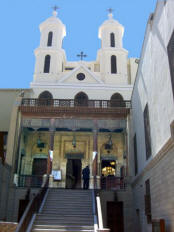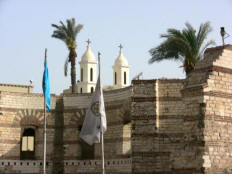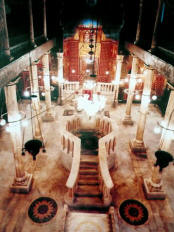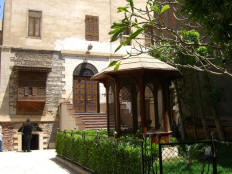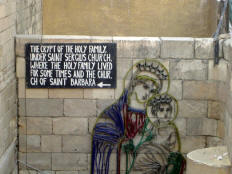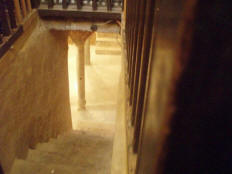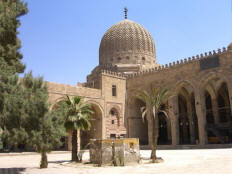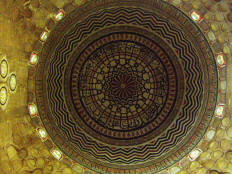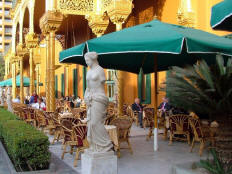Page 1 2 3 4 5 6 7 8 9 10 11 12 13 14 15 16 17 18 19 [History] Thursday, 12 April (continued). Our next stop was an area called Old Cairo or sometimes Coptic Cairo. Although the roots of Cairo can be traced back to the ancient city of Memphis (established nearby around 3100 B.C. and for a time the capital of Ancient Egypt), the modern city began with the oddly-named Babylon Fort, a Roman fortress built about 150 A.D. [The name is said to have originated around 2000 B.C. when Pharaoh Senusret I (12th Dynasty) brought Babylonian captives to Egypt to build public works. These prisoners eventually revolted against the Egyptians and built the first fortification on the site. When the Persians occupied Egypt (525-332B.C.), they built new fortifications on the ruins, keeping the Fortress of Babylon name. The Romans did the same when they occupied Egypt.] We visited St. Mary's (Sitt Miriam) Coptic Church, commonly called the Hanging Church because it was built on top of one of the Roman towers (originally in the 3rd or 4th century; rebuilt in the 7th & 10th centuries). [The Coptic Church is an Egyptian offshoot of the Eastern Orthodox family of churches. It has been a distinct church body since it broke away in 451 A.D. It has its own pope (or patriarch).] From there we walked past a couple of the Roman towers to the Ben Ezra Synagogue, the oldest in Cairo. It was originally a church, but in 882 A.D. the Coptic Christians sold it to the Jews to raise money to pay taxes imposed on their churches by Cairo's Muslim rulers. We continued through the narrow streets to the Church of St. Sergius (Abu Serga), the oldest church in Cairo (late 4th century, but much restored and rebuilt). It supposedly was built above the cave where the Holy Family rested at the end of their journey into Egypt. The crypt below the present church contains the remains of the original church, including the legendary cave. The crypt was closed because of water seeping in. (Apparently the combination of a inadequate and leaky sewage system and a rising population has caused the water table to rise dramatically in many areas of Egypt, especially around Cairo.)
Next our bus took us to a group of several cemeteries collectively called the City of the Dead. Salah explained that, because of the country's chronic housing shortage, millions of poor families live in the larger mausoleums and tombs built by wealthy families. Our destination was a huge 15th century Mamluk mausoleum. It was larger than many mosques and beautifully decorated inside. [The Mamluks originally were non-Muslim boys, captives or slaves, converted to Islam and rigorously trained as mounted soldiers for Arab sultans. Over time they became a powerful military caste. In Egypt they seized power for themselves and ruled as sultans from 1250 to1517 when the Ottoman Turks conquered the country. Even then they retained considerable local power until 1811.]
The bus then took us to the Khan el Khalili Bazaar, which began in 1382 as a caravansary. We arrived at 13:00 and were given just 50 minutes to look around on our own. We were severely limited in our exploration, though, by the need to be able to find our way back to the bus on time. The bazaar was like a maze. I had a sketch map on the back of a flyer we'd been given, but it was utterly worthless. That meant we pretty much had to go back the same way we'd come. We were almost back to our starting place and still had 15 minutes left, so we stopped in a shop to see if we could get Jane a galabeya (kaftan). That was a mistake. Bargaining is an art in Egypt and the proprietor refused to be rushed. His greeting and offers of hospitality took more than half our available time, and we rudely had to rush off before we'd even found anything to bargain for.
The bus had us back to the hotel at 14:15 and we had lunch at the beautiful Garden Promenade Cafe', a string of outdoor tables along the sidewalk behind the old palace. We were hungry and had way too much to eat. The service was slow and it was after 15:00 by the time we finished. Then we went to our room and started packing for our early morning departure. At 17:00 we attended a lecture by an American expatriate on her experience of marrying an Egyptian, converting to Islam, and living the last 15 years in Cairo. It was interesting, but she'd led such a privileged life (and without children) that it was hardly typical. Afterward we went back to our packing. We were still so full from our large, late lunch that we decided to skip dinner. Since we had to get up so early the next morning, we went to bed at 20:00. | ||||||||



